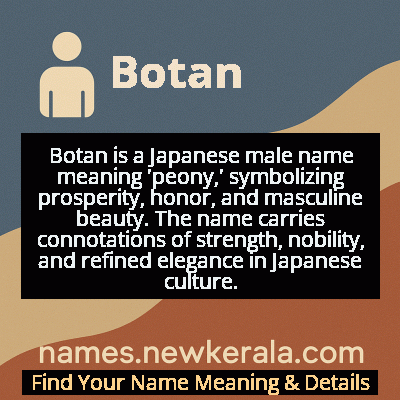Botan Name Meaning & Details
Origin, Popularity, Numerology Analysis & Name Meaning of Botan
Discover the origin, meaning, and cultural significance of the name BOTAN. Delve into its historical roots and explore the lasting impact it has had on communities and traditions.
Name
Botan
Gender
Male
Origin
Japanese
Lucky Number
7
Meaning of the Name - Botan
Botan is a Japanese male name meaning 'peony,' symbolizing prosperity, honor, and masculine beauty. The name carries connotations of strength, nobility, and refined elegance in Japanese culture.
Botan - Complete Numerology Analysis
Your Numerology Number
Based on Pythagorean Numerology System
Ruling Planet
Neptune (Ketu)
Positive Nature
Intuitive, analytical, spiritual, and inquisitive.
Negative Traits
Secretive, reserved, aloof, and can be overly critical.
Lucky Colours
Green, yellow.
Lucky Days
Monday.
Lucky Stones
Cat’s eye, moonstone.
Harmony Numbers
1, 5, 6.
Best Suited Professions
Scientists, researchers, spiritual leaders, detectives.
What People Like About You
Depth of knowledge, analytical skills, spirituality.
Famous People Named Botan
Botan Kawahara
Kabuki actor
Renowned performer in classical Japanese theater known for his dramatic roles
Botan Takahashi
Sumo wrestler
Achieved sekitori rank and known for his floral-inspired fighting name
Botan Suzuki
Contemporary artist
Modern painter blending traditional Japanese floral motifs with urban aesthetics
Name Variations & International Equivalents
Click on blue names to explore their detailed meanings. Gray names with will be available soon.
Cultural & Historical Significance
In traditional Japanese art and literature, peonies often appear in contexts celebrating masculine virtues, from Noh and Kabuki theater to ukiyo-e prints depicting heroic figures. The name Botan thus carries connotations of nobility, strength, and refined beauty that have been valued across Japanese history. The cultural importance extends to festivals and family crests (kamon), where peony designs signify aristocratic lineage and martial accomplishment.
Extended Personality Analysis
Individuals named Botan are often perceived as possessing a blend of strength and elegance, much like the flower itself. They tend to be confident, ambitious, and naturally leadership-oriented, with a dignified presence that commands respect. These personalities typically exhibit a strong sense of honor and loyalty, valuing tradition while also possessing the courage to stand up for their principles. Their inner strength is balanced by an appreciation for beauty and refinement, making them both formidable and cultured.
Botan-named individuals often excel in situations requiring both strategic thinking and aesthetic sensitivity, whether in artistic pursuits, business, or community leadership. They may be somewhat reserved initially, but reveal deep warmth and generosity to those who earn their trust. This combination of martial spirit and artistic sensibility makes them particularly well-suited for roles that bridge different domains or require both creative and practical problem-solving abilities. Their natural authority is tempered by a genuine concern for others' wellbeing, creating leaders who inspire both respect and affection.
Modern Usage & Popularity
In contemporary Japan, Botan remains a distinctive but relatively uncommon male name, often chosen by parents seeking a name with strong cultural roots and elegant symbolism. While not among the most popular names, it has maintained a steady presence, particularly in families with artistic or traditional leanings. The name has seen occasional resurgences in popularity during periods of renewed interest in classical Japanese culture, and in recent decades has gained some international recognition through Japanese cultural exports, though it remains primarily used within Japan. Modern bearers of the name often appreciate its unique combination of floral beauty and masculine strength, making it appealing to parents who want a name that breaks from more common choices while still honoring Japanese heritage.
Symbolic & Spiritual Meanings
The peony, and by extension the name Botan, carries rich symbolic meanings in Japanese culture representing prosperity, honor, and happy marriage while embodying the concept of 'otokodama' or masculine spirit. The flower's large, showy blooms symbolize wealth and high status, while its thorny stems represent the protective strength required to maintain that position. In the language of flowers (hanakotoba), peonies convey messages of bravery, nobility, and good fortune, with the name connecting to Buddhist concepts of the 'peony lion' where feminine beauty tames masculine strength. This duality makes Botan a name encompassing both power and refinement, suggesting an individual who can navigate practical demands while pursuing beauty and meaning.

